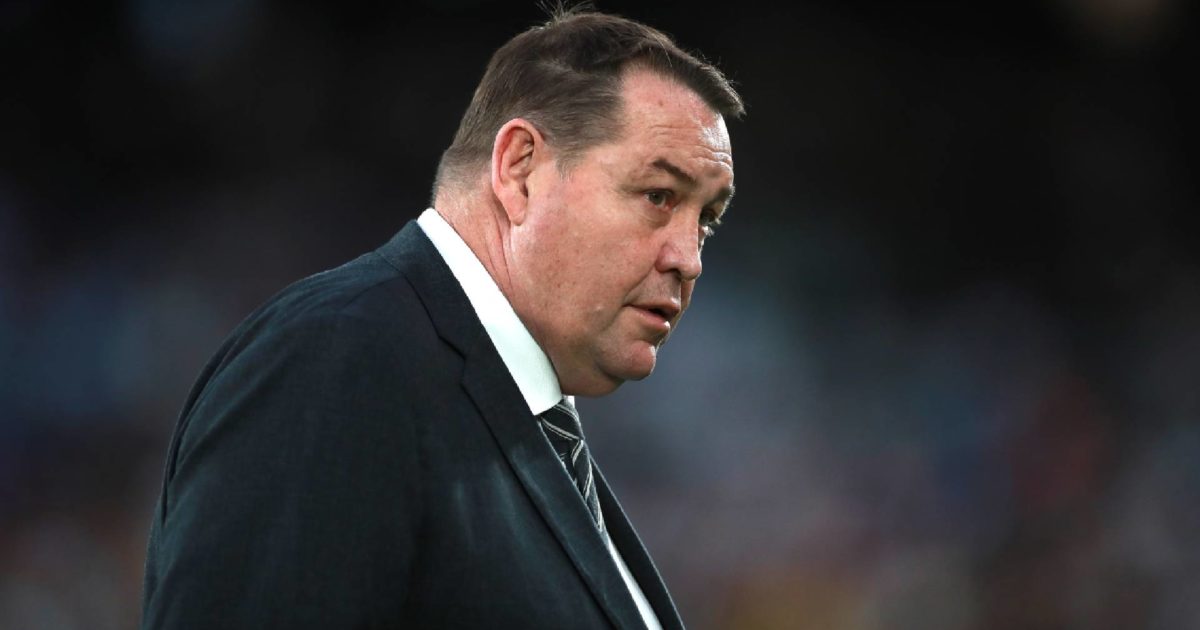Sir Steve Hansen sheds light on how he used to pick All Blacks squads

Sir Steve Hansen has opened up on how he and his colleagues selected All Blacks squads during his time at the helm of the New Zealand national side.
Regarded as one of the greatest coaches of all-time, Hansen was part of the All Blacks set-up as an assistant coach from 2004 to 2011 before succeeding Sir Graham Henry as head coach from 2012 to 2019.
During his time on New Zealand’s coaching staff, Hansen won back-to-back World Cup titles in 2011 and 2015 and enjoyed an unprecedented 92.6 percent win rate from 68 test matches between 2012 and 2016.
As such, Hansen was crowned World Rugby Coach of the Year four times, the second-most successful recipient of that award behind five-time winner Henry, cementing his status as one of the greatest coaches in the history of the game.
Much of Hansen’s success with the All Blacks can be attributed to his selection of players, many of whom he handed international debuts to and went on to become the best in the world in their respective positions.
Those players include Conrad Smith, Jerome Kaino, Kieran Read, Owen Franks, Ben Smith, Israel Dagg, Sam Whitelock, Sonny Bill Williams, Brodie Retallick, Julian Savea, Aaron Smith, Sam Cane, Beauden Barrett, Dane Coles, Ardie Savea and Rieko Ioane.
The selection aspect of his coaching role is one that Hansen has now shed some light on in a recent interview in which he detailed the processes that go into how an All Blacks squad is picked.
Speaking to the New Zealand Herald, Hansen outlined that “80 percent of the [coaching] job is done if you’ve picked the right players”, and stipulated that “95 percent of New Zealanders who follow rugby could pick 95 percent of the [All Blacks] team.”
According to the 62-year-old, it is the remaining five percent of the All Blacks squad that requires due consideration and debate among the selectors, a process that he said “could take a couple of days, even a couple of weeks.”
“You pick yours, I’ll pick mine. It’s only a paper team,” Hansen told the New Zealand Herald of the method he and his fellow selectors used to pick All Blacks squads.
“When the nitty gritty comes, what we used to do was write your own team up, and all the players we agree on, they’re in. Where there’s uncertainty, we keep having conversations until there’s no uncertainty.”
Unlike the general public, though, Hansen said he and his colleagues had far greater access to wide-ranging and in-depth information about those competing for All Blacks selection.
“We’re totally informed about all the things that we’re looking for,” he told the New Zealand Herald.
“Whether it’s fitness data, skill data, home life, injuries. A lot of players are playing with niggles from injuries. Some are playing with something in the background in their lives that could have an effect on form.”
However, in spite of all the information available to All Blacks selectors, Hansen said there were times that he still picked players based on intuition and faith in their ability rather than recent form and data.
An example of that was his continual selection of Ma’a Nonu, who, as an established All Black, often struggled to perform in Super Rugby, but remained a constant figure in Hansen’s squads despite public opposition to his inclusion in the national set-up.
“Ma’a Nonu was a unique sort of individual who sometimes struggled at Super Rugby, but he certainly never struggled at test rugby,” Hansen said.
“The pundits who said, ‘You can’t pick Ma’a Nonu, he’s playing poorly,’ they weren’t taking into account that we had all the confidence in the world that when it comes to test rugby, he would get it right.
“So, when you’re getting down to the final call you’ve got guys who you know have the mental fortitude and the skill level to play at that level, because they’ve proved it.
“Whereas a guy that hasn’t been in that arena, you have to look into the future. You want to know what his mental fortitude is like, and you’re watching later in the Super competition when the pressure’s on whether he’s coping okay.”
Hansen’s comments come days after New Zealand Rugby [NZR] chief executive Mark Robinson confirmed Hansen’s former assistant Ian Foster will retain his place as All Blacks head coach following a “rigorous and robust” end-of-season review.
Foster’s reign at the helm of the All Blacks has been heavily scrutinised since he took over from Hansen as head coach of the New Zealand national side.
A shortened 2020 campaign ended with a win rate of just 50 percent and included a first-ever loss to Argentina, while last year’s extended season saw the All Blacks fall to defeats against the Springboks, Ireland and France.
Those three losses were the most the All Blacks since suffered in one year since 2009, but, speaking at a press conference on Thursday, Robinson said NZR were happy with Foster’s efforts.
“There had been a full look at all aspects of the campaign last year and in all aspects we’re very comfortable with Ian’s performance through that time and the level of work he’s undertaking at the moment. There’s strong support there.”



























































